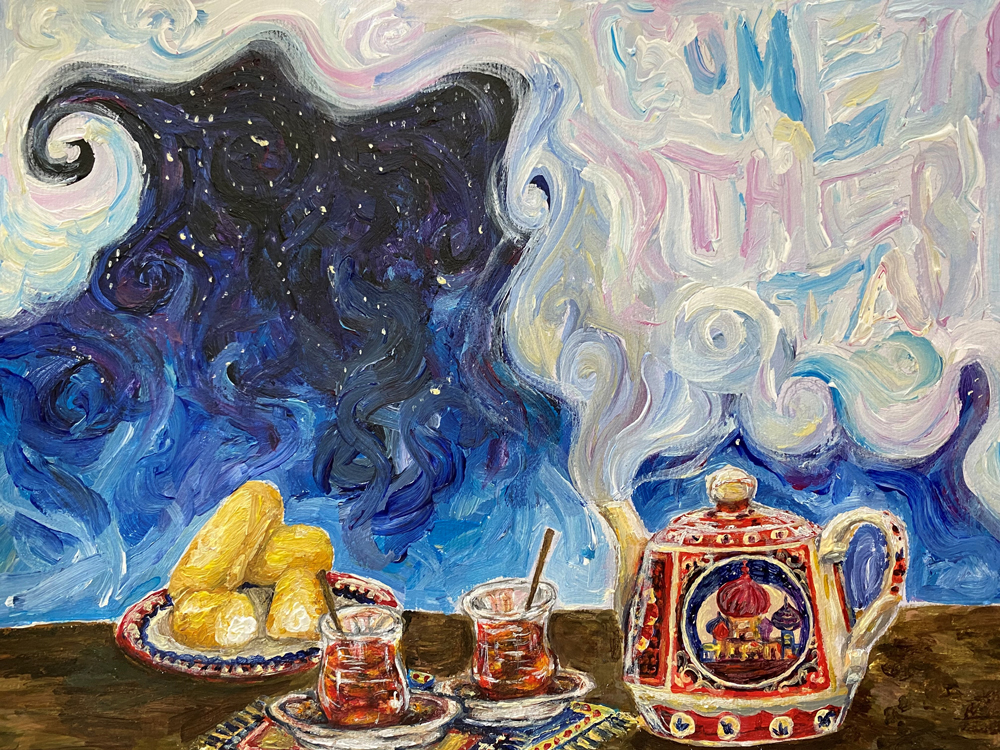/prod02/channel_1/media/christ-at-the-core/merging-two-images-together-2000-2000X700.jpg)
An Artist's Response
This information on this page is part of Wheaton College's 2023 Core Book program. This year, we are reading Daniel Nayeri's Everything Sad Is Untrue. Learn more about Core Book. The art on this page was created by Wheaton College student Kristen Baurain (add graduation year?). Read Kristen's explanation of her artistic vision and inspiration for her beautiful original art.
Kristen Baurain
“If we can just rise to the challenge of communication—here in the parlor of your mind—we can maybe reach across time and space and every ordinary thing to see so deep into the heart of each other that you might agree that I am like you.” - Everything Sad is Untrue, page 16
This is one of my favorite quotes from Everything Sad is Untrue. It is a call--even a plea--from the author for the reader's valuable attention, and a key inspiration for not only how I decide what to make, but why I make it. In a world increasingly choke-full of media and shrinking 8-second attention spans, I need more reasons than ever to keep creating for anyone who is willing to stop and look. The book exemplifies the openness, vulnerability, and courage in the act of storytelling and memory. Daniel Nayeri's attitude toward hospitality and communication--one of invitation, connection, and friendship--is what I strive for with everything I make. Art creates spaces for us to connect with one another, for a storyteller to connect with a listener. We can reach across barriers of status, time, space, and experience by listening to one another's stories in the parlor of our minds. I wanted to use these paintings as a way to invite viewers into the book's weirdness, childishness, and wonder.
As I started mixing pigments and re-listening to the audiobook, I found myself thinking not so much about these nice-sounding abstract ideas, but of food. The pages of the novel are practically edible, sticky with Twinkies, Orich bars, and baklava. I found the contrast between Oklahoman BBQ-esque foods and Persian food hilarious, and fascinating. Pictures began to emerge--tables laid with both Persian and American food, with decorously placed Twinkies alongside traditional Persian teas. I found myself connecting this food symbolism that runs throughout the book not only with the idea of mixing cultures, but with the hope of communion and connection across differences through food. Food creates so many stories in this book, whether it's Baklava boosting Daniel's popularity in Ms. Miller's class or a sloppy Joe sandwich eliciting an embarrassing bathroom experience. Trying new foods while sipping a cup of tea takes time and attention, creating space to have a "complicated conversation," as Nayeri says. To be human is to eat, and to eat together is to acknowledge the humanity of those you break bread with.
Once I'd painted these Oklahoman-Persian spreads, something seemed to be missing. Like Daniel Nayeri's storytelling, they needed to be right on the edge between myth and memory, trust and wonder--they needed to be weirder! Hoping I wouldn't ruin the entire thing, I drew on the Arabian Nights motif and the dreamlike quality of memory, painting these spaces for communion in the midst of a starry night sky and the cosmos. I painted messily and colorfully, wanting to emulate the childish, vulnerable, and mythical nature of the words. Concrete blended with cosmic in the intertwining of teapot steam and twirling galaxies.
My goal was to tell a story of a story with these paintings, and every detail is part of the narrative--the mug rugs, the open hands supported by steaming mugs, and how carefully these hands laid the best tableware. I wanted to convey a sense of welcome and wonder, inviting people to sit, eat, and listen. Having finished them, I ultimately have little control over what people will actually choose to take away from these paintings. If they encourage even one person to pick up Everything Sad is Untrue, or to think about communing with one another, or to be a better listener of stories, I will be thankful.
